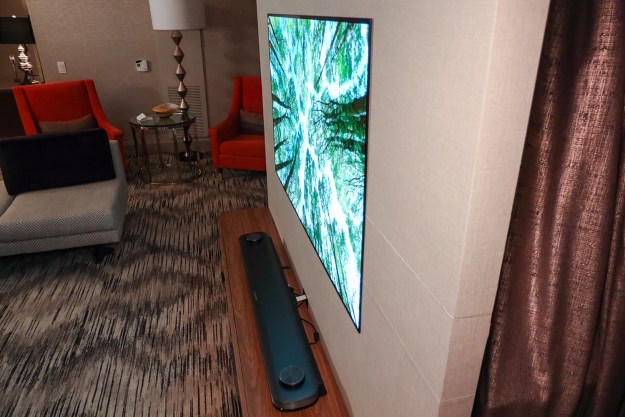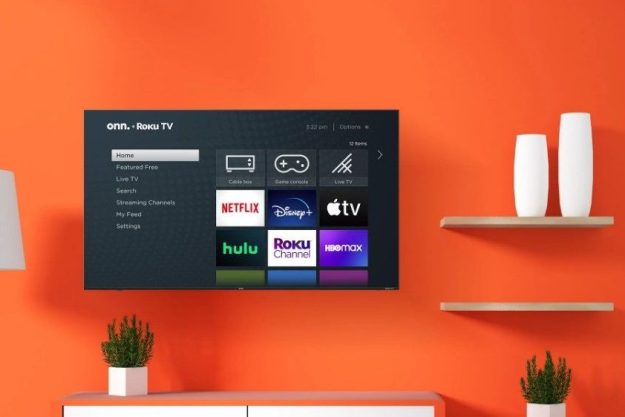
- Best picture quality available
- All HDR formats supported
- Stunning, sleek design
- Solid sound quality
- Sound bar is large and required
In case you missed it, LG’s W7 series “wallpaper” OLED TV was the toast of CES, and for good reason. For many, it represents the ultimate in TV design. At just 2.57mm thin – about the thickness of three quarters stacked together – it looks more like a window on the wall than any TV you’ve seen before. And at about 16.5 pounds, the display panel is light enough to hang like a piece of art, held fast by a set of magnets. In terms of cool-factor, no other TV can touch it.
Except, of course, its upcoming follow-up, the LG W8 OLED. Keeping all the same design cues, right down to the included soundbar, the W8 improves on the W7 in a number of ways. LG’s new a9 (pronounced Alpha 9) chip not only offers a speedier experience with webOS 3.5, but offers enhanced picture quality with reduction in color banding and a host of other improvements. The W8 also features Google Assistant and LG’s new ThinQ platform, which work together to offer up a strikingly large number of unique voice commands. While the W8 is the new kid on the block, that could mean a price drop in the W7, so if you’re interested in possibly saving a few bucks on a TV that is still a great pick, read on.
Striking design is just the beginning of the story here. Certainly, because it is an OLED TV, reviewers such as myself are necessarily going to trip over themselves coming up with new ways to describe just how much of a feast for the eyes it is, but the W7 series is part of a new breed of OLED televisions for LG – one that is brighter, more accurate, and more capable than those of the past – making the task even tougher.
What’s more, while the W7 itself is certainly a remarkable TV, perhaps more exciting is the fact that every series in LG’s OLED lineup this year uses the same panel and the same processing chips. That means that, depending on your demand for fancy design elements and enhanced audio systems, you can get the same stunning picture quality throughout the line, right down to the “entry-level” B7 series, expected to be unleashed in April 2017.
Given the Signature W7 OLED’s unique must-mount requirement, LG opted to bring reviewers to the TVs rather than send TVs to reviewers, who likely wouldn’t be able to temporarily install a panel that uses an unconventional mounting system. I was flown to San Francisco for a reviewer’s workshop and given a rundown on what’s new for LG’s OLEDs, a fascinating tour of Dolby’s laboratories, and roughly 4 hours of alone time with a production version of the Signature W7 to evaluate its place within this year’s crop of ultra-premium TVs.
Truth be told, I only needed a few minutes.
Unusual, but ultimately easy to setup
I didn’t get an opportunity to un-box the 65-inch Signature W7 OLED myself, but I know what comes in the box and what happens after you open it. Now is as good a time as any to address the 25-pound, silver-backed gorilla in the room.
Okay, maybe likening this TV’s requisite soundbar to a gorilla is a bit of an exaggeration, but considering how svelte the display is, it’s hard for the sizeable soundbar not to come off as a little bit imposing. It is neither slim, nor is it light. You can’t wall-mount it, and there’s no point in trying to tuck it away, either, as it is the TVs sole source of sound. Like it or not, the W7 comes with company – but at least it sounds good.
You’ll be needing a piece of furniture big enough to accommodate a sound bar measuring 57.5 × 3.3 × 8.2-inches (W×H×D) and weighing in at 23 pounds. This could be a credenza, entertainment cabinet, or a stout shelf deep enough to allow cable connections.
Not only does the W7’s Dolby Atmos-equipped sound bar serve as the system’s sonic source, it also houses the display panel’s power supply, processing, input/output jacks, and all the other goodies you would find hiding behind the bump-out on the back of a conventional TV. That hardware had to go somewhere, and since this is LG’s first go at a very imaginative product, they decided to bundle it in a sound bar.
The hardware had to go somewhere. LG decided it would go in a sound bar.
I know many will be quick to question why LG didn’t choose to put all the TV’s guts inside a black box which could be tucked away in an entertainment cabinet or closet. After all, anyone who drops $8,000 or more on a TV is probably going to have a premium sound system at the ready to pair with the TV. However, keep in mind this is LG’s first go at any such product, and the company had good reason to think customers would want speakers of some sort. LG would be taking all kinds of heat if it decided to drop speakers entirely.
So, be patient. Your speaker-less wallpaper OLED with black-box companion could be right around the corner. For now, if you want what is arguably the coolest-looking TV on the planet, it comes with a big-ass sound bar. First-world problems, am I right?
The cable that connects the sound bar to the display panel is a broad, flat, off-white cable with a subtle texture suitable for painting over. If you want, you can stretch the cable from the sound bar to the TV and simply paint it the same color as your wall. Alternatively, you could run it through a conduit and up through the wall to comply with building codes. The cable itself is not rated for in-wall use.
All source components will connect to the soundbar, likely to one of four available HDMI (HDCP 2.2) ports, though a composite or component video connection can also be made using a set of provided break-out cables. Three USB ports (one of which is USB 3.0) are also available for playing back photos, video, or music files. Those who do wish to employ some sort of outboard audio system can use an optical cable, or the ARC-enabled HDMI 2 port. If you want a Dolby Atmos signal from the TV’s apps (Vudu currently supports this) then the latter is the way to go. The sound bar will pass through
Mounting the panel is easy. A few drywall anchors is all it takes to secure a thin and light mounting plate to the wall. From there, the panel is affixed to the plate by hanging on two key-hole style mounts, and is further secured by an array of magnets. The panel literally snaps into place.
Flagship TV, flagship features
The W7 doesn’t sport a ton of new features over last year’s 6-series models, but what is new is notable, and it all has a significant effect on the overall performance of the TV.
LG has added a “Neutral Black OLED polarizer” to the TV’s existing anti-reflective film to help keep black levels looking great in bright rooms. Previously, you’d get a little bit of purple haze when bright light shone on the TV. The polarizer works, and the screen looks black in most situations now, though if you shine a flashlight on it, you will see some purple glow coming back at you. LG has also enabled finer brightness controls so that each degree of adjustment has a smaller effect, and there is now a broader range of adjustment available.
The W7 Signature OLED TV has been improved to offer roughly 25 percent more luminance. For Cinema settings, this means the TV will max out at about 540 nits, though the TV is capable of higher peak brightness in Vivid and Standard picture modes.
Blacks have also see some welcome improvement. One of my criticisms of past LG OLED TVs has been that the TVs lacked some detail in the shadows because they would go from dark grey to pitch black a little too quickly. LG has added some finer gradation here, and the shadow detail is noticeably improved while watching content. I verified this observation using a test pattern disc.
Color banding has reduced significantly thanks to these improvements. You’ll still see it on compressed content coming from
Finally, I noticed that whites on the 2017 OLED samples seem purer than in years prior. In the past, I’ve noticed a slight, greenish cast to whites, but that appears to be gone now. I also noted far less color shift at extreme viewing angles than I have in the past.
All in all, I think LG has just about fixed all the tiny issues that reviewers have raised in the past, and thus I believe the W7 will be a universally well-reviewed TV.
Here, have more HDR
As before, LG continues to support both Dolby Vision and HDR10, but this year adds support for Hybrid Log Gamma (HLG) for over-the-air HDR broadcasts, along with a new flavor of
The ‘Magic Motion’ remote really is magic
I continue to find LG’s TVs extremely easy to use thanks to its WebOS interface, now in version 3.5. LG’s elongated “Magic Motion” remote control continues to be one of the better laid-out TV remotes I’ve used, with numerical keys which can be mapped out to call up specific apps and inputs when “long-pressed.” There are already dedicated buttons for Netflix and Amazon toward the bottom, though.
Settings are easily accessed using LG’s WebOS 3.5 software, and now there are even more picture presets. For SDR mode, there is an ISF-Night and ISD-Day mode, so professional calibrators can configure the TV for optimal performance in bright and dark rooms.
Similarly, LG has added a
It’s worth mentioning that LG’s factory presets are extremely good this year. If you aren’t a professional calibrator and/or don’t intend to hire one, then I wouldn’t bother messing with the settings save to turn off the motion smoothing feature – you stand to do more harm than good. I’ll also add here that LG’s presets are so good, I might even question the value of anyone bringing in a calibrator, save for those who demand absolute cinematic standard perfection.
The best picture in the business gets better
I’ve not been shy about proclaiming my belief that LG’s OLED TVs are the finest money can buy, and I’m not about to stop now. With the improvements LG has made, its OLED televisions are even harder to beat – and I firmly believe the only TV that stands a chance at beating them is Sony’s forthcoming XBR-A1E Bravia OLED TV. I’ll have to wait until I can pit the two against each other to make the call, but it will be a very tight race, indeed.
With specific regard to the 65-inch W7 Signature “wallpaper” OLED TV I viewed for this review, I must say I think it’s a spectacular achievement for LG. I don’t think it was all that hard to pull off technically, but the net effect is incredible, and if we’re talking about spending more than $5,000 on a TV, I feel like the spectacle really needs to be at this level.
LG’s OLED TVs are the finest money can buy.
Picture performance, as I have already suggested, is outstanding. With the W7 Signature OLED you get perfect blacks, excellent brightness and contrast, near-perfect color, and top-notch picture processing. The result is an image you want to stare at all day long. The W7 makes you want to revisit old favorite movies you’ve not seen in a while, and makes you excited to check out the latest titles coming out in Ultra HD Blu-ray. Plus, when
Deadpool looked better on the W7 Signature OLED than I’ve seen on any competing television, including the stunning Sony Z9D. The texture in the main character’s uniform popped out hard against the dreary yet glaring grey background during the movie’s opening car fight scene. The gleam of highly-polished car paint was intense thanks to the HDR10 information coming from the Ultra HD Blu-ray disc we watched, while the flames engulfing exploding vehicles bordered on blinding, with rich and scorching hues of orange and red.
One movie scene after another, I got the feeling that what I was seeing was closer to what the films’ directors intended me to see than anything I had experienced outside of a theater before. And that’s no accident.
As part of the reviewer’s workshop I participated in, LG had a 65-inch E7-series OLED sitting right next to the legendary Sony BVM-X300 OLED mastering monitor. This is the 30-inch monitor many movie studios use during the coloring and mastering process as a movie is being finished. It’s considered by many to be a reference standard … and LG used it to tune its OLED TVs this year. The resemblance is striking to the naked eye, especially considering the Sony monitor is a pure RGB OLED screen, while LG continues to use a RGBW style with a white subpixel to enhance brightness.
In short, the W7 Signature OLED is the most remarkable TV we’ve reviewed yet, and very well may end up being the finest TV produced thus far in terms of picture quality.
But how about that sound bar?
I wish I could be a little more enthusiastic about the
To be fair, I’ve experienced moments when the virtual surround sound effect was very convincing, but I’ve had more moments when it wasn’t. I believe there’s a very specific set of environmental conditions, combined with very specific seating locations, that must come together to make the virtual
During my evaluation – which was admittedly very much not working in the sound bar’s favor – I moved to various seating positions, trying to get the impression sound was coming from the screen and not the sound bar, and trying to feel effects coming from the screen rather than the sound bar below it. I just couldn’t make it happen. I have experienced it before, and in some unlikely environments, so I know it is possible, but I can’t help but wonder how many will experience this sound bar’s best efforts.
Potential W7 Signature OLED owners should temper their expectations a bit with regards to the surround sound claims LG makes, and instead focus on the fact that the sound quality of the system is far better than any TV with no sound bar. Bass is ample, if not extremely deep, the midrange is uncongested, if not especially transparent, and the treble, while not refined, refrains from being aggressive or abrasive.
Our Take
The LG W7 Signature OLED TV is a remarkable achievement for LG, and a class-leading television. This is what a flagship TV should look like, and I gladly give it top marks for this review. I waffled a great deal between a 4.5- and 5-star rating – I give out so few 5-star reviews, and for good reason — and what is a “perfect TV,” anyway? But despite the slight quibbles I have over the required sound bar, I am overwhelmed by its stunning design and outstanding picture quality.
If you want to spend less or do without the sound bar, then you don’t have to by the W7; you can buy one of LG’s other fine OLEDs. But if you do want a TV that is as close to a poster on the wall as you can get, the W7 is the only way to go. LG has done what no other has before, and I feel it deserves recognition for that.
Is there a better alternative?
It is possible Sony’s forthcoming Bravia OLED TV could be very competitive, but I have my doubts it will be significantly superior than the LG Signature W7 OLED TV. This is such a unique offering that alternatives will be hard to find. At the least, no competitor is as thin.
How long will it last?
Given LG has outfitted the W7 OLED with advanced processors capable of being updated to cover all foreseeable
Should you buy it?
If you have the cash and want the coolest looking TV on the planet, then by all means, absolutely buy the LG Signature W7 OLED TV. If the price is a little excessive and you just want to get at the amazing picture quality LG’s 2017 OLEDs deliver, you’ll get exactly that from the less expensive B7 or C7 series.
Update: Added info on the new LG W8 OLED TV.















